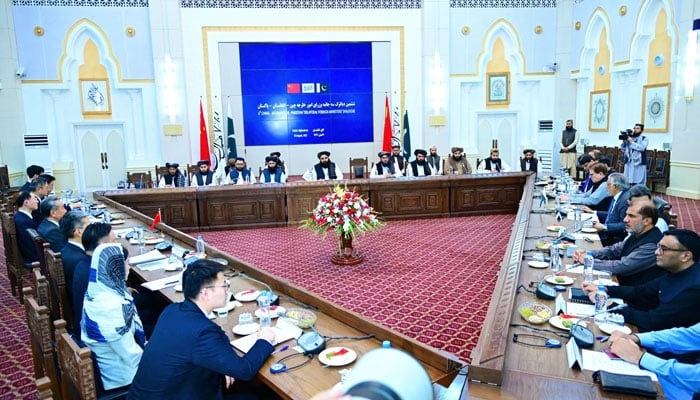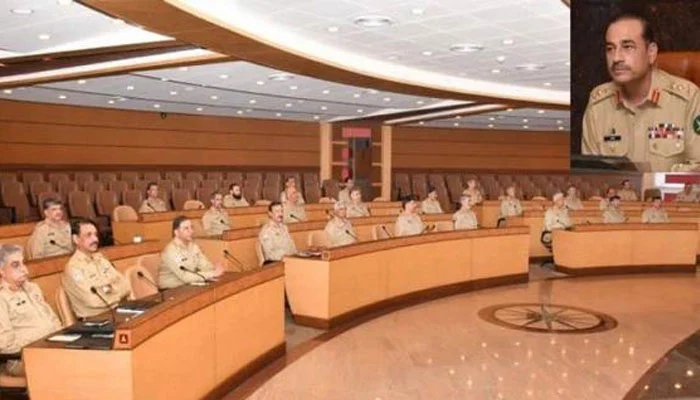Pakistan-Afghanistan relations have entered a new phase of cooperation after the sixth Trilateral Foreign Ministers Dialogue held in Kabul, where Pakistan, Afghanistan, and China reaffirmed their commitment to working together against terrorism and deepening economic and political ties. The meeting reflected growing consensus on counterterrorism, regional development, and expansion of trade and connectivity projects.
A United Front Against Terrorism
The trilateral dialogue was attended by Pakistan’s Deputy Prime Minister and Foreign Minister Ishaq Dar, Afghanistan’s Acting Foreign Minister Mawlawi Amir Khan Muttaqi, and China’s top diplomat Wang Yi. The three sides reiterated their resolve to enhance joint efforts in combating terrorism, drug trafficking, and transnational crime.
During bilateral talks on the sidelines, Ishaq Dar urged Kabul to take verifiable measures against terrorist groups such as Tehreek-e-Taliban Pakistan (TTP), the Balochistan Liberation Army (BLA), and the Majeed Brigade. These groups have been linked to a surge in attacks inside Pakistan since 2021, particularly in border regions like Khyber Pakhtunkhwa and Balochistan.
The call came after the United States recently designated the BLA and its militant wing, the Majeed Brigade, as Foreign Terrorist Organizations (FTOs). This international recognition adds weight to Islamabad’s concerns and puts pressure on Afghanistan’s interim government to act decisively.
Escalation in Terrorist Attacks
The urgency of counterterrorism cooperation is underscored by alarming statistics. According to the Pakistan Institute for Conflict and Security Studies (PICSS), July 2025 saw 82 militant attacks across the country, causing 101 fatalities and 150 injuries. Victims included 47 civilians, 36 security personnel, and 18 militants.
Although June witnessed a brief decline in terrorist activity, the resurgence highlights the continuing security threat. For Pakistan-Afghanistan relations to improve sustainably, progress in counterterrorism remains vital. Islamabad has repeatedly emphasized that groups using Afghan soil to attack Pakistan remain the single greatest obstacle to peace in the region.
Expanding CPEC and Economic Cooperation
Beyond security concerns, the trilateral dialogue emphasized economic and regional connectivity. All three sides welcomed the extension of the China-Pakistan Economic Corridor (CPEC) into Afghanistan, which could significantly boost trade and infrastructure development.
Afghanistan’s participation in CPEC would not only provide Kabul with modern transport and energy networks but also enhance Pakistan-Afghanistan relations by fostering shared economic interests. Improved trade routes and cross-border transit agreements could also reduce smuggling and foster legitimate business growth.
The three nations reaffirmed collaboration in health, education, and culture—areas often overshadowed by security discussions but essential for long-term regional stability.
Diplomatic Progress in Pakistan-Afghanistan Relations
The Foreign Office spokesperson noted that both ministers expressed satisfaction with the upward trajectory of ties, citing the recent elevation of diplomatic representation between the two countries from chargé d’affaires to ambassadorial level. This step was agreed during the trilateral meeting in Beijing in May 2025 and marks a significant diplomatic milestone.
Reflecting on recent visits by Ishaq Dar to Kabul in April and July, as well as the May Beijing meeting, both sides acknowledged that most decisions from these engagements have been implemented or are close to completion. This consistency suggests that Pakistan-Afghanistan relations are gradually moving beyond rhetoric toward tangible results, particularly in trade and transit.
Balancing Security with Progress
Despite these encouraging signs, Ishaq Dar admitted that progress in counterterrorism still lags behind advancements in political and commercial ties. While Kabul has assured that Afghan soil will not be used by terrorist groups against Pakistan, Islamabad insists that words must translate into verifiable action.
The DPM’s call for “concrete and verifiable measures” reflects Pakistan’s desire for accountability and transparency. Without this, economic cooperation and regional integration may be undermined by persistent security challenges.
China’s Role as a Stabilizing Partner
China’s participation as a facilitator underscores Beijing’s growing influence in regional affairs. For Pakistan, China remains a trusted ally, while for Afghanistan, Beijing represents both an investor and a mediator. By supporting security and development initiatives, China helps stabilize Pakistan-Afghanistan relations while safeguarding its own interests in regional peace and economic corridors.
The sixth Trilateral Foreign Ministers Dialogue in Kabul reflects cautious optimism for the future of Pakistan-Afghanistan relations. The reaffirmed commitments to combat terrorism, expand trade, and deepen cultural and educational ties are important steps forward. However, the rise in cross-border terror incidents shows that genuine progress in security cooperation remains the most pressing challenge.
As Pakistan, Afghanistan, and China push forward with initiatives like extending CPEC and strengthening diplomatic engagement, the ultimate success of Pakistan-Afghanistan relations will depend on whether Kabul delivers on its promises to curb terrorism. Only through mutual trust and verifiable action can both nations ensure stability and prosperity in the region.



